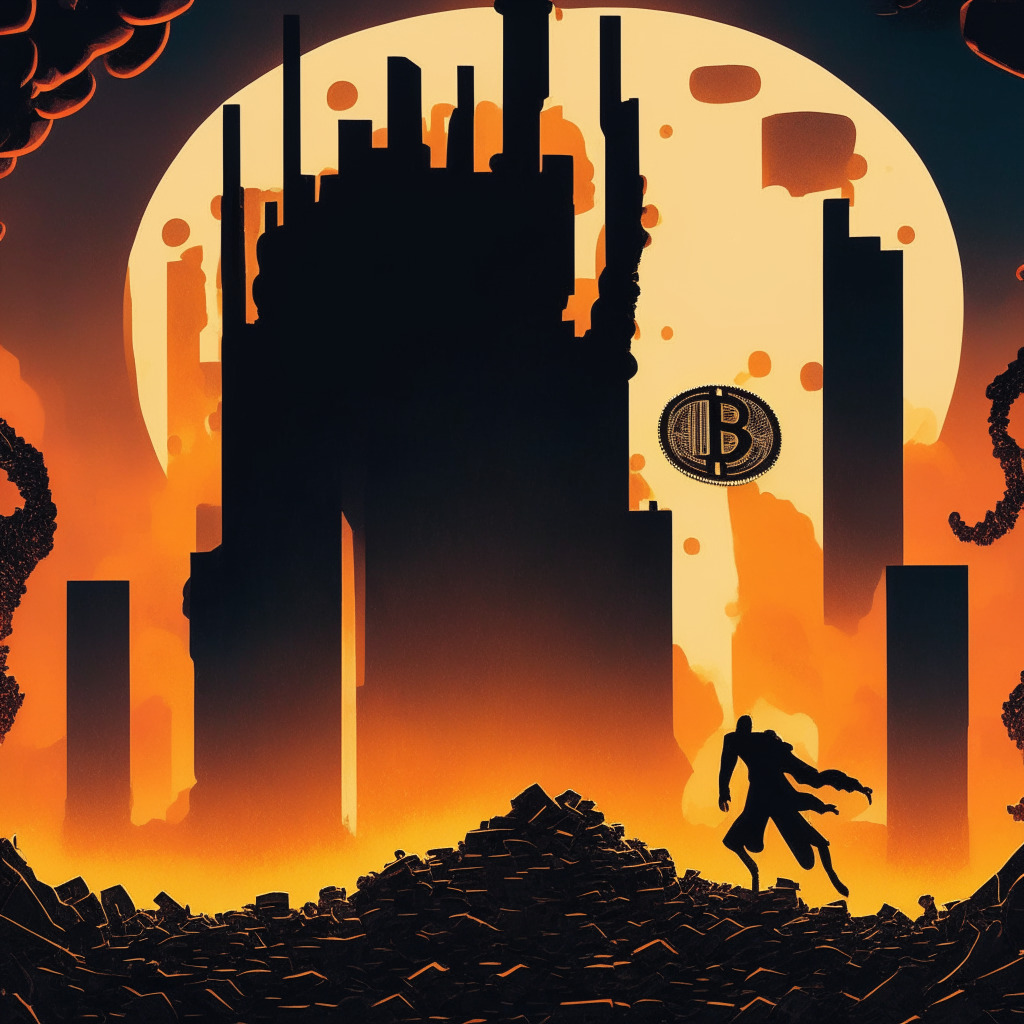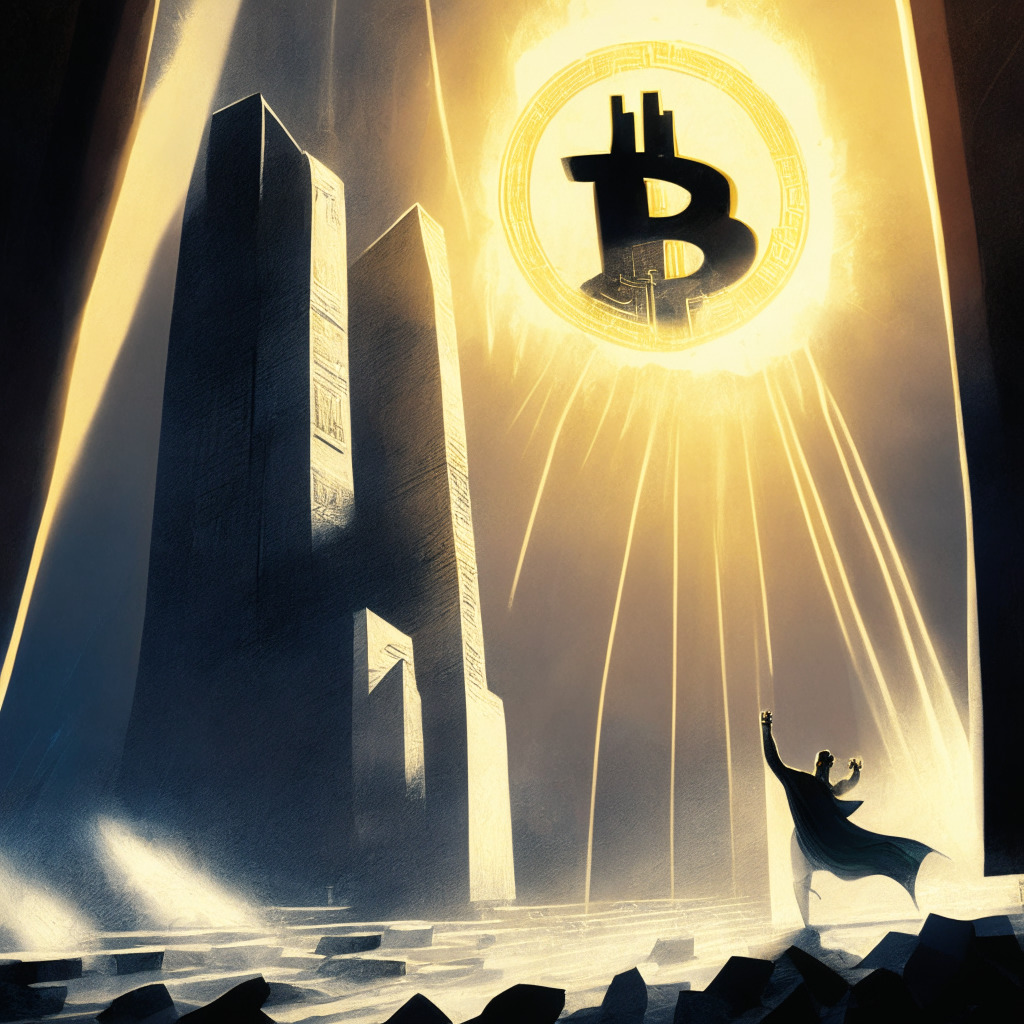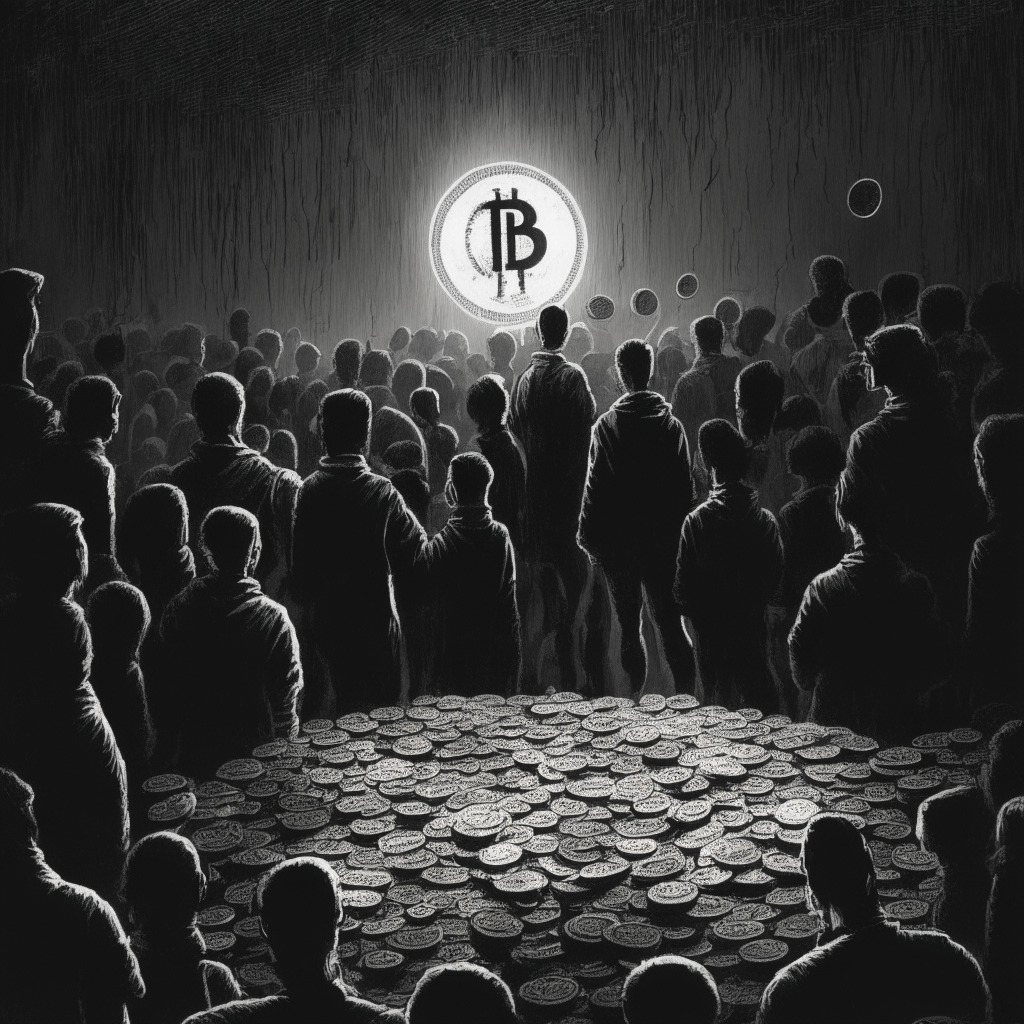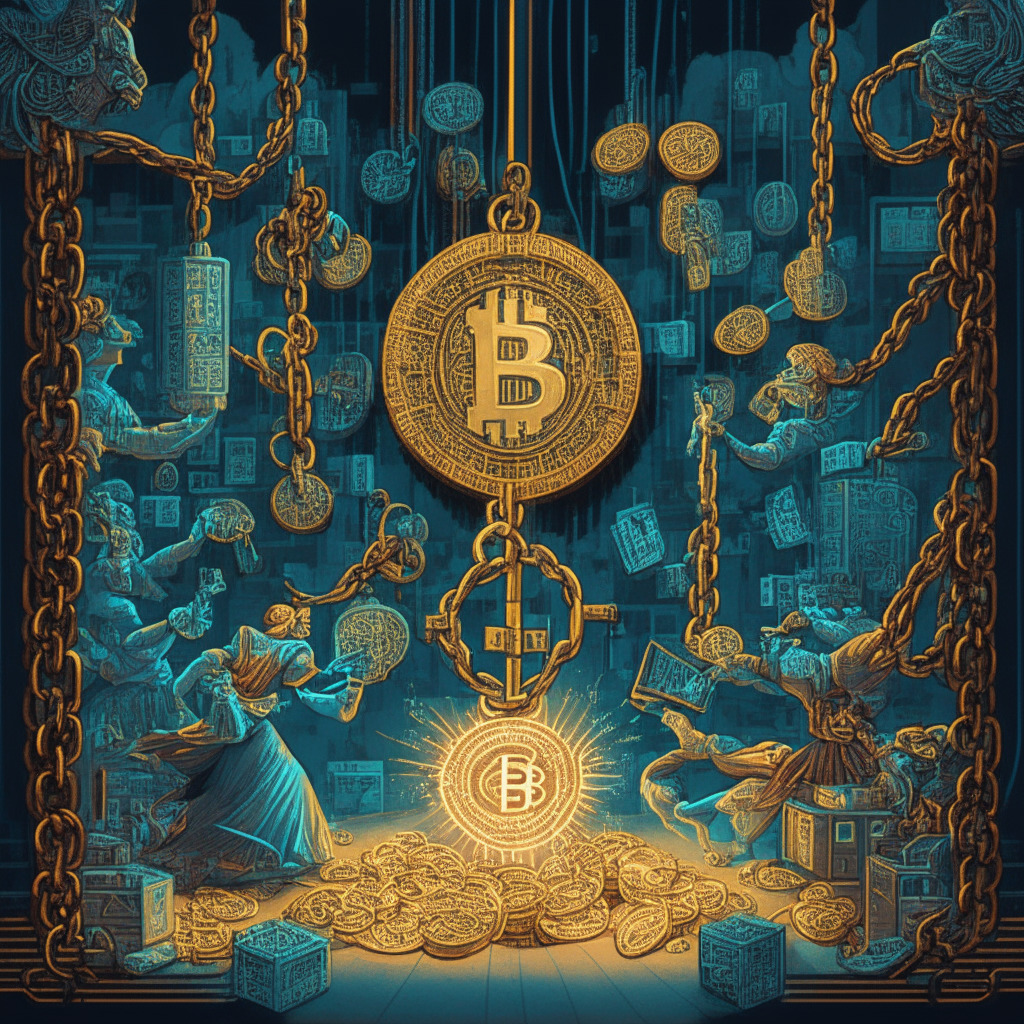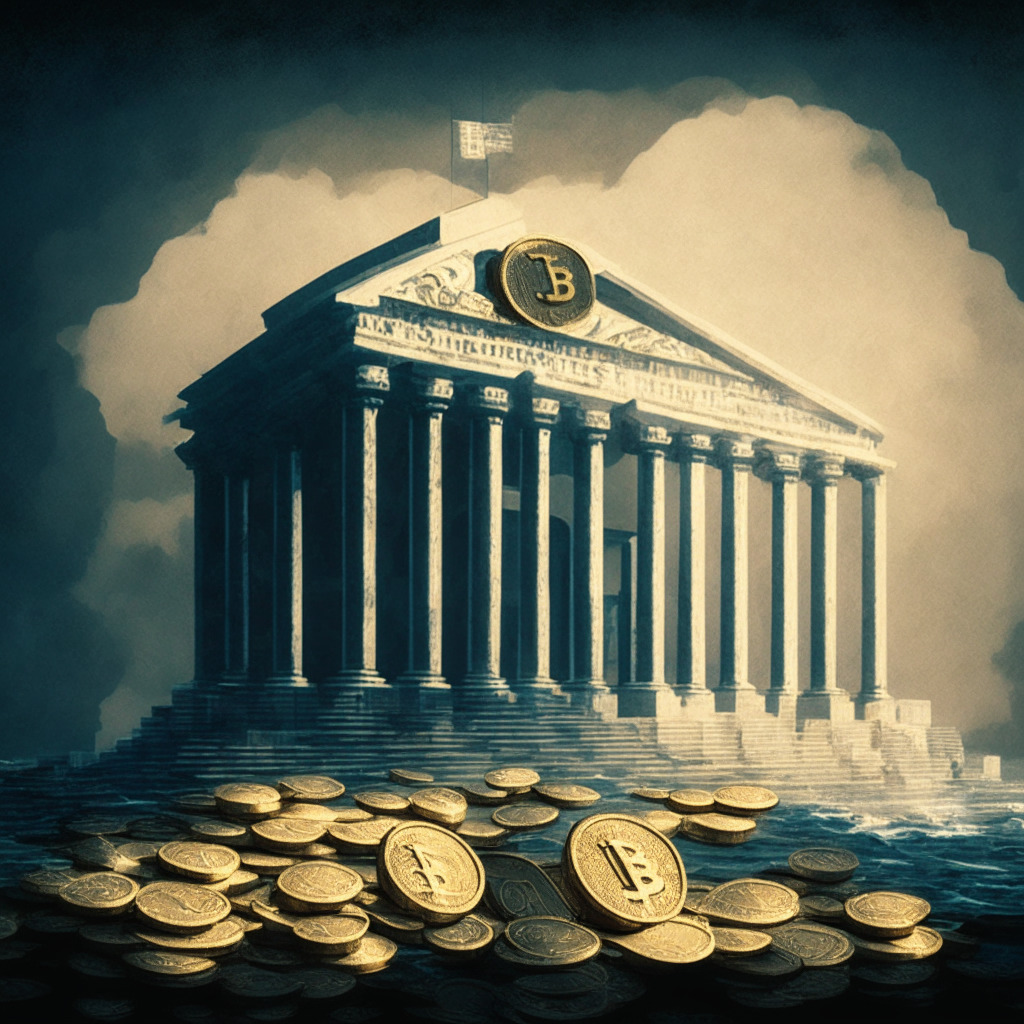“Unstoppable Domains has unveiled Unstoppable Messaging, a product of the Web3 messaging network XMTP. Meanwhile, Binance.US has paired with MoonPay to allow customers to convert USD into tether (USDT) amidst their comeback from a dollar deposit suspension. Despite advancements, cybersecurity challenges persist in the blockchain world.”
Search Results for: USDT
BNB Value Dips Amid Binance Controversies: Ripple Effects & Possible Solutions
“The BNB crypto token has experienced a decrease in value due to Binance’s questionable activities and increasing legal scrutiny, affecting its $32 billion market position. Binance’s involvement with offshore funds movement amid international sanctions has heavily impacted BNB’s value and broader digital currency markets.”
Unveiling the Truth: How BlackRock and Government Regulations Impact Bitcoin Prices
This article discusses theories around sudden Bitcoin price drops, with factors like governmental regulations, exchange manipulations, and whale movements. It highlights the speculation around BlackRock’s influence on Bitcoin’s price, possibly benefiting from reducing Bitcoin’s price before launching its own Bitcoin ETF. However, it emphasizes that such theories often disregard the complexity and evolving nature of the cryptocurrency market.
Coinbase Set to Acquire Minority Stake in Circle amidst USD Coin Developments
Coinbase is reportedly purchasing a minority stake in Circle Internet Financial, which coincides with Circle bringing the issuance of the USD Coin entirely in-house. Additionally, six more blockchains are to be integrated with USDC. This move comes amidst increasing competition and regulations within the stablecoin environment.
Unraveling the Luthra-Bitget Feud: A Tug of War Between User Rights and Exchange Protocols
“A prominent crypto influencer, Evan Luthra, is suing Bitget cryptocurrency exchange for freezing his account and blocking access to $200,000. Bitget alleges market manipulation with Luthra’s account associated with the newly listed REELT token. This highlights the complexity of maintaining market integrity, user rights, and trust within the unregulated crypto industry.”
Crippling $1 Billion Crypto Liquidation: Markets in Turmoil, Caution Urged
“A sudden slump in Bitcoin and Ether prices caused a frenzy in the cryptocurrency market, leading to large-scale liquidations and a loss of estimated $1B. As per Coinglass, 176,752 traders got liquidated within 24 hours. Market volatility, macroeconomic conditions, and range-trading tendencies have contributed to this downturn. Despite potential rewards, the inherent risks underscore the need for thorough research before investing.”
Coinbase Halts Trading of Stablecoins Amid Tough Crypto Regulations in Canada
Coinbase, a major cryptocurrency exchange, announces the suspension of trading for three popular stablecoins in Canada starting from August 31. Despite the trading halt, the wallets will still be functional for deposits and withdrawals. However, Canada’s stern stance towards crypto service providers and stringent regulations have led to many crypto exchanges, including Binance and OKEx, pulling out from the Canadian market.
How Elon Musk, Trump Remarks and Tether’s Pivoting Impact BTC’s Market Volatility
“In the unpredictable cryptocurrency market, Bitcoin’s recent 11% decrease has been impacted by significant events including Elon Musk’s sale of Bitcoin and former president Trump’s cautionary remarks on the US currency system. Additionally, Tether’s decision to cease support for USDT on certain platforms adds to the market’s instability.”
Crypto Heist Aftermath: The Case of Cypher Protocol’s Stolen Assets Freeze & Redemption Plan
“Cypher Protocol, a Solana-based decentralized futures exchange, managed to freeze $600,000 of stolen crypto assets after a security exploit. A vulnerability in tracking isolated sub-accounts let an attacker exploit the flaws and drain $1 million in various cryptocurrencies. Negotiations with the hacker for return of assets remain uncertain.”
Cryptocurrency in China: A Cat and Mouse Game of Capital Control and Legal Dilemmas
“Mr. Chen, a Chinese individual, was sentenced to nine months for aiding a $13,104 USDT transaction. Viewed as money laundering by authorities due to Chen’s personal bank information involvement, this reflects China’s stringent crypto stance linked to capital control regulations.”
Ethereum Rebounds Amid Rumors of SEC’s Possible Ether Futures ETFs Endorsement
Rumors of the SEC possibly endorsing Ether futures ETFs have factored into a recent rebound in the Ethereum price. However, while firms have requested to launch ETFs, there’s no definitive confirmation of approval. Amidst these speculations and dynamic market fluctuations, informed decision-making is key.
Shibarium Launch Overcomes Initial Hurdles Amid Skepticism: The Shiba Inu Ecosystem Unraveled
“The Shibarium mainnet launch encountered high user traffic and technical issues, with suspicions around its stability due to possible asset losses. Shibarium aims to rectify these bumps by advocating their proof-of-participation consensus mechanism for efficient and scalable Ethereum-based transactions, while facing the unpredictable nature of crypto markets.”
Tether Discontinues Bitcoin, Kusama and Bitcoin Cash-Based Stablecoins: Impact on Crypto Landscape
“Tether, the issuer of popular stablecoin USDT, discontinues its Bitcoin, Kusama, and Bitcoin Cash-based stablecoins due to low usage. It reflects Omni’s crucial role and considers reinstating Omni Layer version if utility increases. Also, Tether plans to introduce a new Bitcoin-based smart contract system, “RGB”.”
Canada’s Crypto Conundrum: The Fate of Stablecoins Amidst Surging Regulations
“Crypto exchange Coinbase is set to suspend trading of stablecoins USDT, DAI, and RAI in Canada as part of major service changes. Despite Coinbase’s recent expansion in Canada, increasing regulations have caused reconsideration of operating strategies within the country’s crypto market.”
Regulatory Ripples: The SEC’s Case against Ripple and the Future of Stablecoins in Canada
“Judge Torres’s ruling in the ongoing Ripple case might bring regulatory clarity to the crypto community. Meanwhile, Coinbase suspended certain stablecoins in Canada, raising questions on whether this regulatory rigour might affect the growth of blockchain’s future or secure the crypto future.”
PayPal Enters Stablecoin Market: Catalyst for Regulatory Clarity or a Step Away from Decentralization?
“PayPal’s stablecoin, PYUSD, built on the Ethereum network, signals a major step towards crypto adoption in traditional finance. Despite concerns about its centralized structure, PYUSD could clarify crypto regulations, accelerate token usage, consolidate crypto payment with traditional finance, and encourage wider adoption of blockchain technology.”
Tether’s Discontinuation of Omni and Other Platforms: A Bold Move or High Risk?
Tether, the largest stablecoin issuer, announced to discontinue support for Omni, Kusama, and Bitcoin Cash SLP implementations, causing ripples in crypto community. Despite the change, Tether’s price remained fairly stable, raising questions about subsequent implications for user strategy in the volatile crypto-market.
Untangling WhiteBIT’s Extravagant Promises: The Involved Risks and Rewards in Crypto Lending Platforms
The WhiteBIT platform, connected with crypto figure Justin Sun, promises an alarming 24.8% APY for Tether deposits, tripling the average USD rate. Made noteworthy due to Sun’s history of promoting risky stablecoins, WhiteBIT’s extremely high returns warrant intensive scrutiny from informed investors.
Navigating the Stablecoin Storm: The Push for Regulation Amid Market Instability
Circle’s Chief Strategy Officer, Dante Disparte, emphasizes the need for federal regulation of stablecoins amid market volatility and banking mishaps. Amidst concerns of “counterfeit US dollars using cryptographic methods”, Disparte sees regulation as a safeguard for investors and a protection of monetary policy.
Navigating Through the Bull and Bear Markets: Uncertainties and Predictions for Bitcoin’s Future
“The rise in the U.S. dollar index (DXY) might be an obstacle on Bitcoin’s recovery path. The DXY’s upward trend has likely influenced risky assets negatively, with equities markets seeing a corrective phase. While experts predict Bitcoin consolidation within a specific range, trends in the Ethereum market currently favour the bears.”
Navigating Uncharted Waters: PayPal’s Foray into Stablecoin with PYUSD
“PayPal is venturing into cryptocurrencies with its own stablecoin, PayPal USD (PYUSD), which aims to reduce volatility. Despite competing with established stablecoins in a volatile market, PYUSD’s compatibility with future Web3 applications and PayPal’s reputation could grant legitimacy to the crypto industry.”
Shifting Fortunes as Hedera Outshines Bitcoin and Ethereum Amid Legal and Corporate Drama
“Hedera Hashgraph’s HBAR token saw a 15% surge following its integration into the U.S. Federal Reserve’s instant payment solution, FedNow. Meanwhile, Bitcoin and Ethereum remained stable, highlighting how different tokens react uniquely to market factors. Also, Bank of America believes PayPal’s new stablecoin, PYUSD, may struggle to gain adoption due to competition and changing market conditions.”
Exploring Crypto Stability: Lessons from a ‘404 Page Not Found’ on a Prominent Crypto News Site
“A 404 error on a prominent cryptocurrency news site could foster skepticism about the stability of the tech domain. Missteps will occur, but it’s by overcoming these challenges that a robust and efficient decentralized financial landscape can evolve.”
Crypto Theft Recovery: A Tale of Hope and Caution in Blockchain Security
A recent hacking incident involving the theft of 90 Ether (ETH) has highlighted a potential method of recovering stolen blockchain funds. The victim managed to get the hacker’s wallet blacklisted with the aid of authorities, effectively freezing the stolen assets. This case emphasizes the need for diligent security measures and effective blockchain regulations, as well as the necessity for tech companies and digital asset holders to take responsibility for platform security.
PayPal’s PYUSD vs Major Stablecoins: A Battle for Market Share or a Losing Game?
“Bank of America suggests PayPal’s stablecoin, PYUSD, may struggle in the face of established competitors like USD Tether (USDT) and USD Coin (USDC). Factors such as lack of fresh functionality and wallet compatibility issues could impede its progress. However, PYUSD has potential to enhance customer experience within the PayPal ecosystem and capitalize on blockchain-enabled asset transfers, payments, and remittance services.”
Blockchain Technology: Revolutionary Rewards or Troublesome Trade-offs?
“Blockchain technology has made significant strides, providing security, transparency, and fast transactions while also facing challenges like energy consumption, security loopholes, and regulatory issues. Its potential and drawbacks set the pace for its widespread reception, urging us to tread with caution.”
Bitget Wallet: A Beacon of Safety or A Potential Threat in a Volatile Cryptocurrency Landscape?
Bitget Wallet, previously BitKeep, recently created a $360 million User Protection Fund to enhance security following a malware incident that led millions into loss. The wallet now includes stable payment channels and a P2P marketplace for smoother transactions, while underlining the importance of user education, stringent security measures, and swift responses to breaches.
Chasing Shadows and Rainbows: Blockchain Challenges and Triumphs Unveiled
U.S. crypto exchange Coinbase has unveiled its new Ethereum layer-2 network, Base, potentially causing shifts in the blockchain landscape. Meanwhile, the sector faces challenges around credibility of newly launched stablecoins, possible regulation, and risks from open-source code misuse. Despite these, crypto initiatives continue to grow globally, suggesting a maturing industry.
Surge in Overseas Adoption of USDC Stirs Global Digital Monetary Revolution
Jeremy Allaire, Circle’s front-man, revealed that 70% of USD Coin (USDC) adoption comes from overseas, dispelling the belief that USDC is favoured primarily within the US. USDC supply has shrunk due to decreased demand and redemptions, but its importance in evolving global digital commerce is evident.
Surge in Blockchain-Based T-Bill Offerings: A Financial Boom or Hidden Risk?
Maple Finance, a blockchain-based credit marketplace received a green light to open its cash management pools for U.S. investors. This opens opportunities for investors to park their stablecoin holdings in one-month U.S. Treasury bills, earning a 4-5% annual yield. While the crypto ecosystem appreciates the opportunities, concerns loom over potential risks.
PayPal’s Venture into Crypto: Exploring Revenue Opportunities and Regulatory Challenges with PYUSD
PayPal is launching its own stablecoin, the PYUSD, targeted to become a new revenue channel for the company. Yielding interest from US dollar deposits and transaction fees, the coin aims to venture into the realms of remittances and gaming. However, potential regulatory scrutiny could impact its trajectory.
Crypto Resurgence and the Threat of Sham Tokens: A Guide to Navigating the Blockchain Market Safely
“Today’s crypto sphere sees Bitcoin nearing $30,000, attributed to the unexpected fall in global long-end government bond yields, reacting to China’s disappointing trade record. Concurrently, PYUSD tokens scams alert investors to verify token legitimacy due to unscrupulous market exploits triggered by PayPal’s recent stablecoin launch.”


